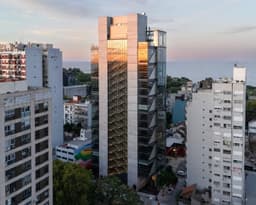Nhóm bản địa Anacé ở Ceará phản đối dự án trung tâm dữ liệu 10 tỷ USD của TikTok, cho rằng không được tham vấn và lo ngại tiêu thụ lớn về nước. Dự án được cấp phép nhưng bỏ qua quyền cộng đồng. Brazil ưu đãi thuế để thu hút các trung tâm dữ liệu.
Điểm nổi bật:
- TikTok đầu tư 10 tỷ USD xây trung tâm dữ liệu tại bang Ceará.
- Cộng đồng Anacé cho rằng họ không được tham vấn và quyền của họ bị bỏ qua.
- Dự án có thể tiêu thụ hơn 30.000 lít nước mỗi ngày, gây lo ngại về nguồn tài nguyên.
- Brazil ưu đãi thuế để thu hút các trung tâm dữ liệu toàn cầu.
- Các cộng đồng bản địa trên thế giới cũng đang đương đầu với các dự án tương tự.
Nhóm bản địa Anacé ở Ceará phản đối dự án trung tâm dữ liệu 10 tỷ USD của TikTok, cho rằng không được tham vấn và lo ngại về lượng tiêu thụ nước lớn. Dự án đã được cấp phép nhưng bỏ qua cộng đồng. Brazil ưu đãi thuế để thu hút các trung tâm dữ liệu.
Điểm nổi bật:
- TikTok đầu tư 10 tỷ USD xây trung tâm dữ liệu tại bang Ceará.
- Cộng đồng Anacé cho rằng họ không được tham vấn và quyền của họ bị bỏ qua.
- Dự án có thể tiêu thụ hơn 30.000 lít nước mỗi ngày, gây lo ngại về nguồn tài nguyên.
- Brazil ưu đãi thuế để thu hút các trung tâm dữ liệu toàn cầu.
- Các cộng đồng bản địa trên thế giới cũng đang phản đối các dự án tương tự.
In late August, an Indigenous group in the Brazilian state of Ceará, in the country’s northeast, brought a formal complaint before federal authorities, asking them to halt the development of a TikTok data center they said was being built on their land.
Sitting under a tall cashew tree, Cacique Roberto Ytaysaba Anacé, a leader of the community, recalled how, until a few months ago, he did not know what a data center was. Now, he’s determined to stave off the giant Chinese social media company in the first pushback of its kind in Brazil, a country aspiring to become a global data center hub.
The Anacé have long claimed the area where TikTok and Casa dos Ventos, a wind energy company that will power the data center, are to be built. Its leaders say their right to consultation — guaranteed under an international agreement — was violated, and that their concerns about the project’s water consumption are being ignored.
“They are putting it right next to the river” on Indigenous territory that holds spiritual and ceremonial significance for the community, Ytaysaba told Rest of World.

Paulo Anace near a river considered sacred to his tribe, which is threatened by a proposed data center. Iago Barreto Soares
The permit process requires Indigenous communities to be consulted before construction on their land, but authorities did not discuss the data center with the Anacé because they do not have official ownership of the land, Ulisses Costa, director of environmental protection and control at the state environmental agency, told Rest of World. The developers have received the necessary authorizations from the local water department, he said.
Demand for data centers worldwide has surged on the back of a boom in artificial intelligence and cloud computing. Resistance from local communities concerned about their environmental impact is also growing. The pushback in Ceará underscores the challenges tech companies face from residents, who are demanding a say in how, where, and even whether data centers should be built.
Cynthia Picolo, executive director at the Laboratory of Public Policy and Internet, called the case “emblematic” for setting important precedents in community consultation.
Elsewhere, Meta shelved a planned data center in the Netherlands after local pushback, and Chilean courts suspended a Google project over water use concerns. Arizona’s city council also rejected an Amazon proposal amid community pressure.
In Brazil, the Anacé fight against a government policy offering tax breaks and exemptions to attract hyperscalers. With over 180 data centers already commissioned, the Ministry of Finance plans a national policy to cement Brazil’s global hub status.
330% increase in requests for data centers to access the electrical grid in Brazil
Nearly 80% of Brazil’s electricity supply comes from renewables, and more than 90% of wind power projects are concentrated in the northeast. Developers have requested national grid connections at a record pace.

The data center will be installed inside this gated area which is part of the Pecém Industrial and Port Complex. Iago Barreto Soares
Without official land titles, the Anacé, like many Indigenous communities, face land loss to mining, logging, and industrial expansion without proper consultation.
After decades of broken promises and displacement—from oil refineries in 2013 to thermal power plants in 2023—the community now demands immediate suspension of permits and future consultations under the International Labour Organization Convention.
TikTok has not commented on consultations; Casa dos Ventos asserts no overlap with titled Indigenous lands and compliance with licensing rules.

The TikTok data center will be installed inside the Pecém Industrial and Port Complex, which already includes steelmakers and cement factories. Iago Barreto Soares
Facing death threats, seven Anacé leaders joined a protection program for environmental defenders. Undeterred, the community plans further actions, from occupying offices to blocking highways, to assert their visibility and rights.
TikTok không trả lời Rest of World về việc tham vấn Anacé. Casa dos Ventos khẳng định tuân thủ quy định cấp phép môi trường.
Tác động và triển vọng tại Việt Nam
Việc dự án trung tâm dữ liệu quy mô lớn của TikTok tại Brazil vấp phải phản ứng kịch liệt từ cộng đồng bản địa cho thấy tầm quan trọng của tham vấn và quản lý tài nguyên nước trong các dự án hạ tầng công nghệ. Ở Việt Nam, khi các tập đoàn công nghệ quốc tế và nội địa đẩy mạnh đầu tư vào các trung tâm dữ liệu, bài học từ Ceará nhắc nhở về:
- Nhu cầu minh bạch và tham vấn cộng đồng bản địa hoặc địa phương, nhất là nơi có giá trị văn hóa – lịch sử.
- Đánh giá tác động môi trường toàn diện, đặc biệt về tiêu thụ nước trong bối cảnh khan hiếm ở một số vùng.
- Cân bằng lợi ích kinh tế với bảo vệ quyền lợi cư dân và nguồn tài nguyên, nhằm tránh xung đột xã hội.
Nếu Việt Nam hướng tới trở thành điểm đến trung tâm dữ liệu khu vực, cần xây dựng khung pháp lý chặt chẽ, quy trình tham vấn minh bạch và chiến lược phát triển bền vững để thu hút công nghệ đồng thời bảo vệ môi trường và quyền lợi cộng đồng.



















